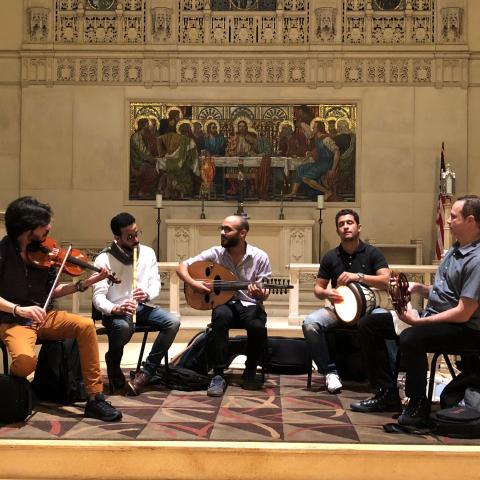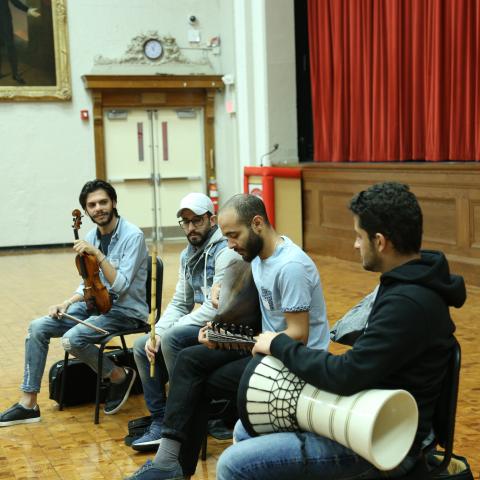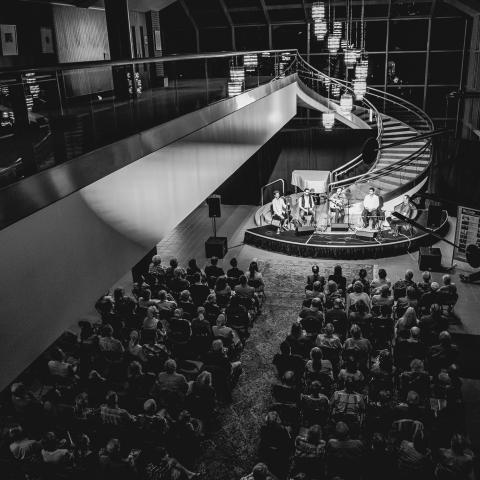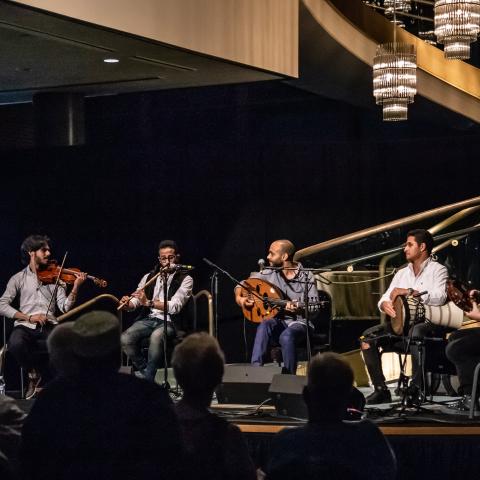
Mohamed Abozekry

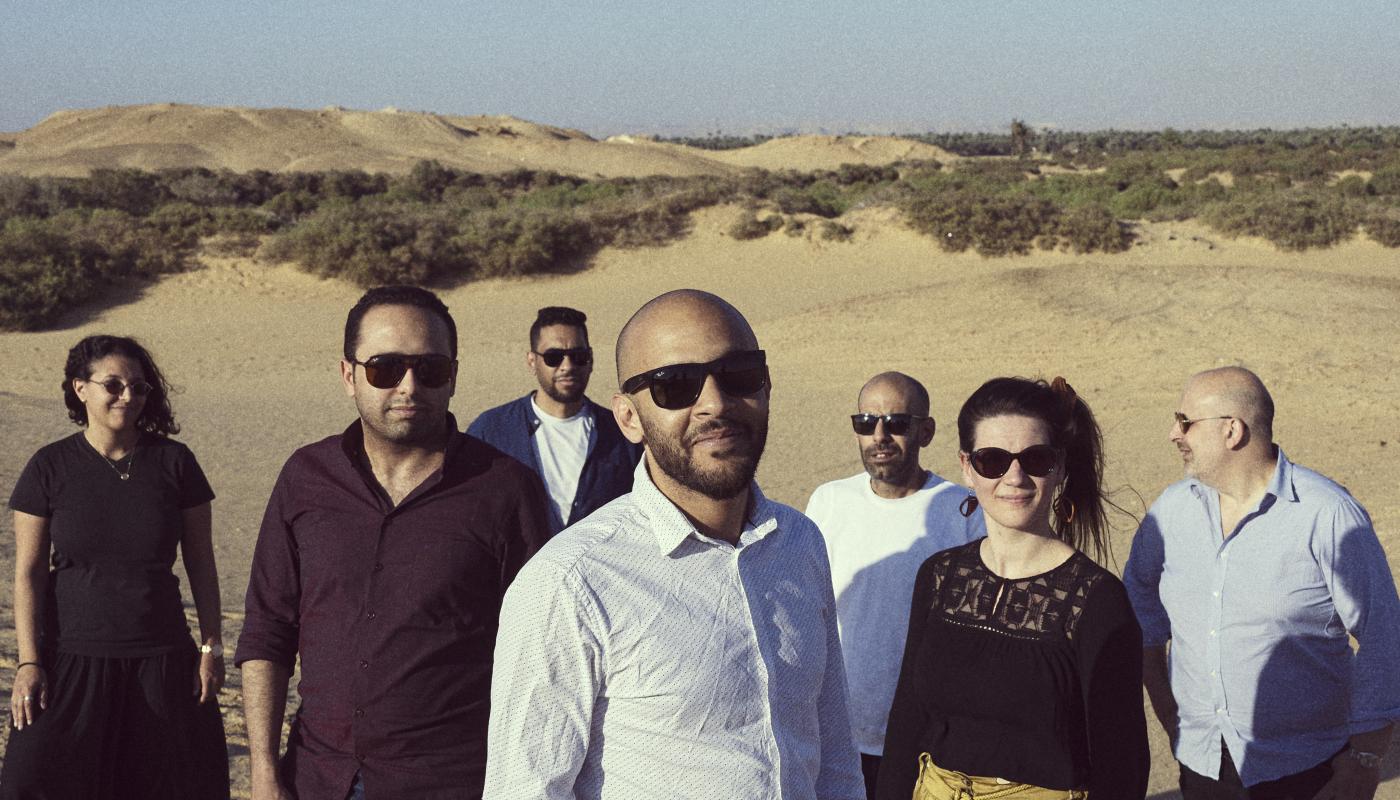
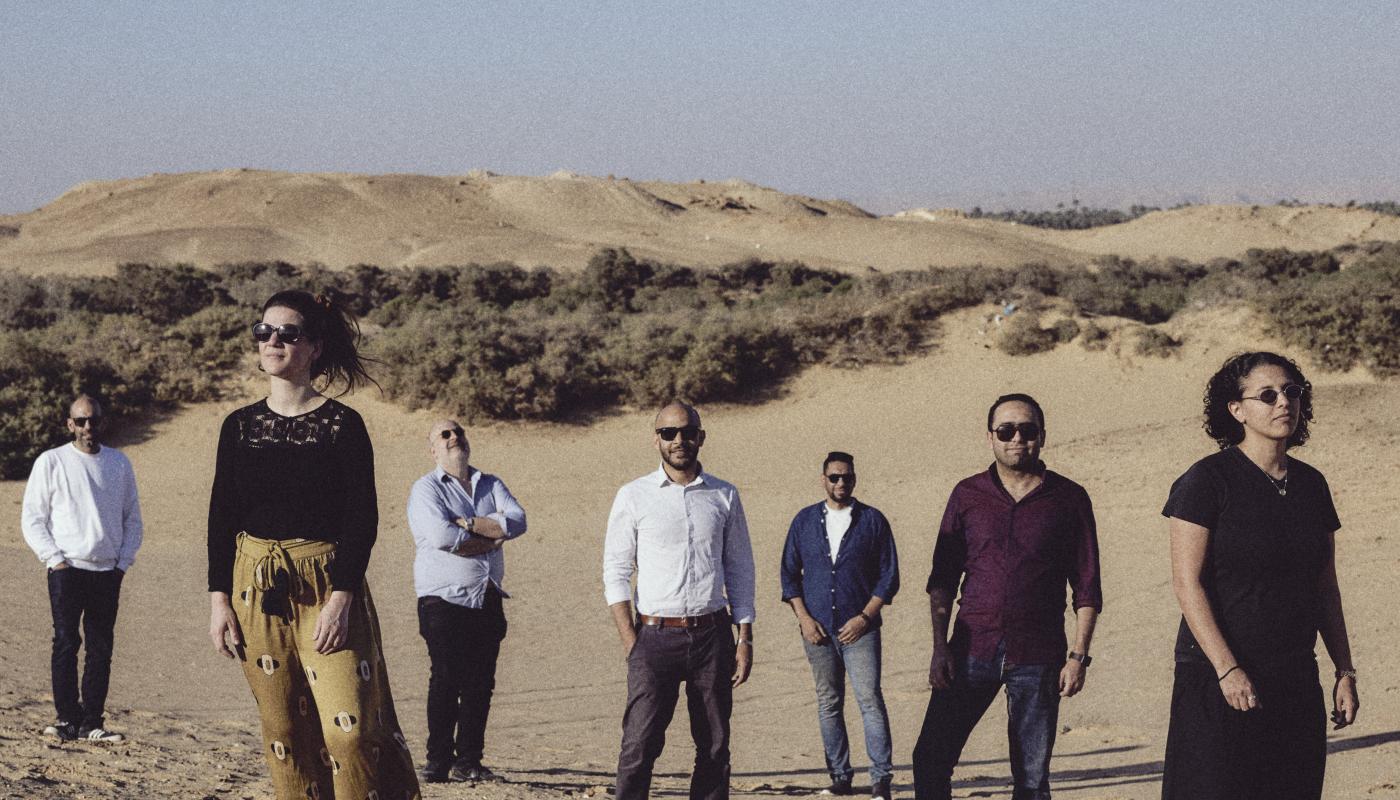
Mohamed Abozekry
Limitless virtuosity with an unbridled imagination: this oud master musically interprets the boundless world around him.
Oud master and musical polymath Mohamed Abozekry has released four albums, each resonant in time and of place, each excavating and renewing the deep frame of Egyptian classicism. With a new sextet featuring musicians working across and around two continents he continues to push the boundaries of what it means to be contemporary. Upcoming release Roh El Fouad (The Heart’s Soul) fuses oud, bass, drums, keyboard, percussion, saxophone, and vocals to form the latest chapter in Abozekry’s improvisational exploration of Egyptian music without a predetermined template.
“I never move backwards, but in a circular motion and return to the place I started with more experience.”
Born in Cairo in 1991, Abozekry graduated at 15 from the Arabic Oud house in Cairo. He was the youngest oud teacher in the Arab world, and in 2009 was awarded first prize at the International Oud Competition in Syria. Later that year, began studying classical music composition. At the age of 18, he began splitting his time in France. The push-pull between his second home in France, and his native Egypt opened a door of inspiration for his work. The many artists he met traveling this path resulted in collaborations with jazz bands, Romani artists, classic orchestras, and electronic musicians. In 2017, following his interest in composing music for cinema, Mohamed Abozekry earned a Master’s in Music Film-Scoring (MAAAV) at Lyon II University, and began scoring for short films and TV shows. Abozekry’s four albums include “Chaos” (Rue Stendhal - 2013) and “Ring Road’ (Jazz Village - 2015) both with his French jazz band HeeJaz; “Karkadé” (Jazz Village - 2016), performed in the U.S. in 2018 on Abozekry’s first Center Stage tour, was a trip back to the source with a team of traditional musicians from Cairo. This was followed by “Trio Abozekry” (Molpé Music – 2018), a collaboration with his brother Abdallah Abozekry on saz and Nicolas Thé on drums.
Mohamed Abozekry sextet
Camille Maussion - Saxophone
George Nabil - Keyboards
André Segone - Bass
Ahmed Aly - Percussion
Kerdani – Drums
Mohamed Abozekry - Oud & Vocals & Compositions
Dynamic, distinctive and exhilarating work of boundless curiosity. What is most impressive, and ultimately most thrilling about the show was how distinctive and majestic Abozekry’s music is. The band were brilliant.”
ny music daily
travelers
7 on tour: 6 musicians and a sound engineer
venues
Concert halls to clubs; excellent, responsive sound system to reinforce acoustic mix.
2018 u.s. debut tour overview
Washington, DC - September 7-10
- Mohamed Abozekry & Karkadé started their Center Stage tour in Washington, DC with a welcome at the State Department, rehearsal time, and sightseeing.
- Their first performance was at Bossa Bistro on September 8th, hosted by Multiflora Productions, followed by a performance at the Kennedy Center Millennium Stage on September 9th.
Lewisburg, PA - September 11-14
- The band spent several busy days in Pennsylvania at the Weis Center at Bucknell University. While on campus, they were hosted for dinner with students and faculty, performed for local 4th and 5th graders, and visited several classes including Film Production, Arts Entrepreneurship, and Nationalism & Music.
- They performed at the Weis Center on September 14th.
Philadelphia, PA - September 15-18
- Mohamed Abozekry & Karkadé headed to Philadelphia for several performances and activities hosted by Intercultural Journeys.
- On September 16th they performed at St. Stephen's Episcopal Church and on September 17th they shared a set with Luke Carlos O'Reilly at Time Bar & Lounge. On September 18th, the group performed a lecture/demonstration for Temple University Students.
- While in Philadelphia, the band was joined by filmmaker Sherief Elkatsha. He filmed and produced a short piece on the group's tour and time in Philly. You can watch the 6 minute piece here.
Brooklyn, NY - September 19-21
- On September 21st, the band performed at Roulette, hosted by Robert Browning Associates. Robert Browning was an advisor for Center Stage.
Burlington, VT - September 22-24
- Mohamed Abozekry & Karkadé performed at the Flynn Center for the Performing Arts on September 23rd. You can see a live stream of the performance from Egyptian broadcast journalist Zahra Ramy here.
Claremont, NH - September 25-26
- While in New Hampshire, the band held two workshop/demonstrations for Stevens High School Band & Choir and for K-8 students at John Paul 2 Academy, as well as toured the Saint-Gaudens National Historical Site.
- They performed at the Union Episcopal Church on September 26th hosted by West Claremont Center for the Arts.
- Egyptian journalist Nourhan Magdi interviewed Mohamed Abozekry over several days in Burlington and Claremont. You can read her interview in Egypt Today here.
North Adams, MA - September 27-29
- The band was hosted by MCLA for their last leg of their Center Stage tour. While in North Adams, they held a workshop/demonstration for Kids4Harmony and MCLA students, attended the local DownStreet Art Walk, and visited several classes including Music Theory and Intro to Music.
- Their final performance was at MCLA's Church Street Center on September 28th.
2018 Program notes & Backgrounder
Mohamed Abozekry & Karkadé
Cairo, Egypt
U.S. debut tour as part of Center Stage
Mohamed Abozekry....Band Leader / Oud / Composer-Arranger
Mohamed Farag..........Ney
Lotfy Abaza.................Violin
Mohamed Arafa...........Dehola & Daf
Hany Bedeir.................Riqq
The oud is often compared to the lute, but can outpace it in muscular firmness, in nimble and evocative tone. Cairo’s Mohamed Abozekry pushes the oud to maximum expressiveness, leading his Arab chamber quintet project Karkadé with swagger and improvisatory spirit.
Mohamed Abozekry has that rare gift of combining limitless virtuosity with an unbridled imagination. An oud master still in his late twenties, Abozekry’s ambitions – to musically interpret the world around him and de-exoticize his instrument – mark him as a polymath of forms. “I never move backwards, but in a circular motion and return to the place I started with more experience.”
Karkadé is Abozekry’s second ensemble and a compositional effort that returns him to his roots, revisiting Egyptian music of the 1920s-1950s – Egypt’s ‘golden age’ – and its spirit of improvisation. Karkadé’s self-titled album was released by Jazz Village/Harmonia Mundi in September 2016.
With Karkadé, Abozekry evokes the hibiscus tea found everywhere in Cairo, and the eponymous French café at which this project was born. He convenes Egypt’s popular and classical music traditions, Sufi calls, and secular poetry, to musically describe a path to an Arab world at peace with its history and turned towards the future.
Mohamed Abozekry embarked on his musical journey at age 11, inspired by his uncle, an amateur musician who introduced him to the instrument. His natural talent was refined under the tutelage of the Iraqi oud master Naseer Shamma, director of the Oud House in Cairo. After four years of study at the institute, Abozekry was awarded his diploma with highest honors, finishing as a soloist and licensed instructor. At 15 years of age, he was the youngest licensed oud educator in the Arab world. He went on in 2009 to win first place in the International Oud Competition held in Damascus Syria.
He traveled to France and completed an advanced degree in Musicology from the University of Lyon. During this period, along with immersing himself in the theory and tradition of Western music, France’s cultural diversity exposed Abozekry to stretches of musical forms, from multiple Latin styles to jazz and Hindustani and Carnatic forms, to the rich repertories and techniques found throughout the African continent.
With his first independent ensemble, Heejaz, a polychrome, hard-driving jazz project, Abozekry released two albums on Jazz Village/ Harmonia Mundi: Chaos in 2013 and Ring Road in 2015. This summer he began touring Trio Abozekry with his brother Abdallah Abozekry on saz et de Nicolas Thé on percussion, with an album slated to be released later this year.
As a soloist with his own projects and in special appearances, Abozekry now tours around the world with stops in France, Tunisia, Algeria, Morocco, Turkey, Bahrain, Jordan, Lebanon, Qatar, The United Arab Emirates, Oman, Iraq, Pakistan, Germany, Belgium, Switzerland, Canada, Venezuela, Peru and Bolivia. He toured in the USA with the acclaimed Nile Project in 2015 and 2017.
When not performing, Abozekry also composes music for film. He has contributed scores for such films as 18 Days, a collective directorial picture screened in the 2011 Cannes Film Festival. It is a film that gives insight into the 2011 Egyptian uprising. Abozekry has also composed for the short film Nsibi directed by Hassène Belaïd in 2014 and Kalam Alamy, a piece for Egyptian television released in 2015.
background
Ever-flowering Oud: Mohamed Abozekry and Karkadé Convene Egypt’s Popular and Classical Music to Cultivate New Sound for Cherished Arab Forms
The oud is often compared to the lute, but can outpace it in muscular firmness, in nimble and evocative tone. Cairo’s Mohamed Abozekry pushes the oud to maximum expressiveness, leading his Arab chamber quintet project Karkadé with virtuosic swagger and improvisatory spirit.
Sharing a name with the fragrant hibiscus tea often enjoyed in Egypt, Karkadé weaves sinuous and aching violin lines, rippling percussion, and delicately potent nay (vertical flute) into Abozekry’s confident playing to evoke the near-forgotten Egyptian music of the early 20th century. Paste enthused that he “has a stunning command of his instrument, as well as an open ear for other forms.”
U.S. Debut Tour in 2018
Abozekry brings Karkadé to the U.S. for the first time, joining four other ensembles from Egypt and Ukraine that will make independent tours of the U.S. from July-December in 2018 as part of Center Stage, a cultural exchange program that invites performing artists from abroad to the United States to perform, meet, and share their experiences with communities around the country. The group’s planned summer-fall 2018 tour is being routed now.
Raised in a family full of amateur players, Abozekry was an oud wunderkind, an upstart maestro performing on television shows several times a week. He was a top student at Cairo’s Arabic Oud House, a musical institution founded by oud virtuoso Naseem Shamma that launched the careers of numerous talented players.
But his status as whiz kid chafed. “There are a lot of child prodigies. They disappear after their burst of fame,” says Abozekry. “I wanted to learn something else.”
Determined to find a way forward, in 2009 Abozekry pursued a degree in musicology at the University of Lyons (France), and dove into a different set of traditions, studying Western classical theory, jazz, blues, and other forms from around the globe. Driven by the resonances and variances between these bodies of musical knowledge, he fused the jagged edges into a polychrome, hard-driving jazz project, Heejaz. Over the following years he also embarked on a schedule of solo and collaborative projects that took him around the globe.
Yet homesickness often haunted Abozekry, despite his expanding success and growing international reputation. Not far from Lyons, he found a small haven called Karkadé. He was befriended by the restaurant’s owner, a fellow Egyptian and a progressive political exile. “We’d sit long into the night listening to recordings of old sufi music,” Abozekry recalls. The elder emigre became a father figure to the young music student; in return Abozekry dedicated his new project to him.
The experiences in France urged Abozekry to dig into the golden age of Egyptian music -- of the 1920s-50s -- before commercial studio recordings and through-composed songs came to dominate. He found a little-remembered world of improvisation, interplay, and sounds derived from Egypt’s many regional styles. He wanted to recapture the same essence in original pieces.
He returned to Cairo and was thrilled by the underground scene, but disappointed to find very few musicians played the brilliantly textured older styles he had come to love. “The commercial scene today has absorbed the overwhelming majority of skilled musicians of the past few generations,” explains Abozekry. “There are fewer and fewer resources for culture, especially for traditional culture. There are also next to no new creations based on this heritage.”
Undeterred, he connected with riq (tambourine) player Hany Bedair, a good friend he had first met back at the Arabic Oud House. Together, they sought out musicians able and willing to join a new group with a different approach to performing. In addition to the more common strings, woodwinds, and percussion, Abozekry longed for a boost of bass that fit the typical instrumentation of an early 20th-century Egyptian ensemble.
“We invited a deholla player to join us,” says Abozekry. “Deholla is the Egyptian variation of the darbouka, made of clay. It’s bigger, more bassy and used in traditional sufi and folklore music. These styles got that bass sound via percussion, the duff (frame drum) or deholla.”
The group revived a key element of earlier styles: group improvisation. “We decided to play completely freely, with improvisation built in,” Abozekry notes. “Every concert is completely different now. If you listen to recordings from the 20s and 30s, it’s there; improvisation is a big part of interaction. And no version is ever the same.” He draws parallels with jazz structures and rock solos, both of which he had incorporated into other projects like Heejaz. “I never move backwards, but in a circular motion and return to the place I started with more experience.”
His bandmates were mildly skeptical at first, but they stuck with him. After a series of concerts in Egypt and the EU, culminating in a show in Paris, however, Abozekry saw his fellow musicians’ transformation. “Lofty, our violinist, came up to me after the show and say that it meant so much to him, to be able to play this way,” recalls Abozekry. “We don’t have the occasions to be free on stage and show what we can do, what we love to do. It was very moving.”
Abozekry intends to see the oud stand on its own and take a substantial role in other musical styles. His current studio project pairs oud with Fender Rhodes and rock trio, though the spirit of exploration and renewal runs through all his work, from film scores, to his contributions to the groundbreaking international collaborative endeavor The Nile Project, to Karkadé’s tradition-based pieces.
“The oud has character as an instrument and doesn’t have to be stuck in any one style,” he opines. “For me, it’s natural that we can find ourselves in a lot of styles. Whatever the culture. We don’t have to be active in only one kind of music, and we don’t have to stick to that ‘exotic oud’ stereotype. It works the same way for both musicians and for the audience.”
additional Press
- Norient: How to Escape Exotism
- New York Music Daily: Mohamed Abozekry & Karkade Bring the Exhilarating Future of Egyptian Music to Brooklyn
- Mada Masr: Sounds of 2018: Boredom, silence, and the music in between
- WYNC New Sounds: Gig Alert: Mohamed Abozekry & Karkade at Roulette
- Telerama: Mohamed Abozekry, Karkadé (English Translation here)
audio
Listen to Mohamed Abozekry & Karkadé:
- Mesh Hekaya (via Spotify)
- Ni Toi Ni Moi (via Spotify)
- Samai Rast (via Soundcloud)
- Karkadé (via Soundcloud)
